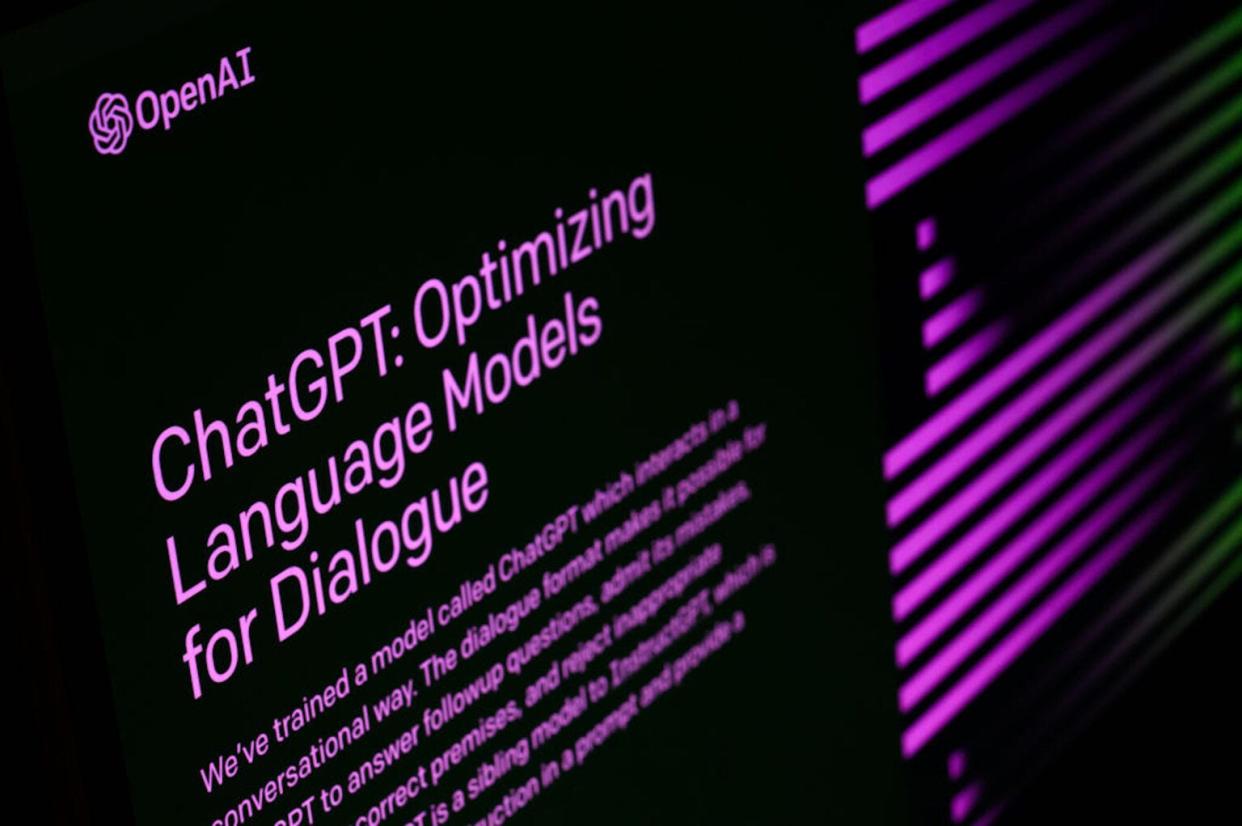A tool of productivity or easy path to plagiarism? FSU, FAMU professors on ChatGPT in education

As technology continues to evolve, an artificial intelligence tool that has become the new hot topic among students and professors is ChatGPT (Generative Pre-trained Transformer) — a chatbot that appears to have all the answers.
As a conversational computer program, ChatGPT responds to questions and commands from users and provides them with detailed, human-like answers through text interactions.
Florida State University Professor Mark McNees, who teaches at the Jim Moran College of Entrepreneurship, says he has a conversation about artificial intelligence every day in every one of his classes.
“It is top of mind. It is what everybody’s talking about,” McNees told the Tallahassee Democrat. He is also the founder of RedEye Coffee.

The free-access tool ChatGPT was released in November after being developed by OpenAI, an American artificial intelligence research company.
From answering complex questions such as putting scientific concepts in simple terms to generating creative ideas like party themes for a 10-year-old's birthday, the chatbot has turned into a life hack for many individuals.
When a message is typed and sent through the tool, the chatbot automatically starts generating a response in the form of full sentences and paragraphs. Users have the option of regenerating the answer to view it in a reworded version if they are not satisfied.
More on ChatGPT: What is ChatGPT? 11 things you should know about the artificial intelligence program
More: Talking Tech: Everything you need to know about ChatGPT
“I use it a lot,” said Florida A&M University Professor Clement Allen, who teaches in FAMU's Department of Computer and Information Sciences. “Artificial intelligence is my research area in general, but it's also just a great tool for productivity. I've used it to help generate exam questions and quizzes for my classes.”
“It’s not that I can’t do it myself, but ChatGPT can speed that process up,” he added.

But the chatbot also has its drawbacks.
A disclaimer on the AI tool’s site explains how it could potentially generate misleading content, stating that “ChatGPT may produce inaccurate information about people, places or facts.”
In addition, the site’s frequently asked questions (FAQs) section addressed a user concern about receiving answers from the chatbot that are unrelated to a submitted question by stating, “ChatGPT will occasionally make up facts or ‘hallucinate’ outputs.”
Being aware of ChatGPT's error possibilities, Allen double checks its responses.
"When I ask ChatGPT to find information for me, I always analyze the results, in the same way I analyze results from a Google search," he said. "In the case of asking ChatGPT to produce something for me — for example, a computer code — I can usually verify the result for accuracy."
What does ChatGPT mean for higher education?
Despite the technical flaws, a concern among professors at large is what ChatGPT's power means for their jobs as instructors — and if the chatbot could ever take their place.
But McNees is not worried.
“FSU, and I think all of academia, is concerned about it,” McNees said. “I’m not concerned about it because I believe we should be teaching skills and how to use AI in an ethical way. I believe AI is the most powerful tool that has ever been created by humanity, and people need to learn how to use it if they want to compete in the future.”
Francesca Fedorca — a recent FSU spring graduate who received her master's degree in integrated marketing communication — was amazed at ChatGPT’s capability when she used the tool for the first time.

The Jacksonville native says she has used the chatbot in class exercises, emails and class assignments when she has a hard time starting.
"Sometimes I find myself with writer's block, and ChatGPT helped me get the ball rolling when writing essays," said Fedorca, 22. "For emails, it was convenient because it helped me write professional-sounding emails with no effort."
"But every time I use ChatGPT, I edit the results to my liking," she added. "I never just copied and pasted the AI results."
Fedorca says the thought of the tool replacing people's jobs and careers is daunting, but she does not think artificial intelligence will ever get to the point of having real-life experiences to pull information from for that replacement to happen.
Other ChatGPT concerns
Additional concerns include the unethical use of ChatGPT, such as cheating.
This means students would have access to a method of passing off outside work as their own, which can be viewed as a form of plagiarism.
ChatGPT detectors — such as ZeroGPT and Originality.AI — are tools that instructors can use to identify if a text was written through artificial intelligence.
Although FSU and FAMU’s academic honor policies don’t touch on the tool specifically, they both have regulations in place that promote the integrity of academic work.
“If suspected academic misconduct arises, FSU’s Academic Honor Policy is robust in terms of due process and broad operational definitions that cover these types of allegations — regardless of what technology may be used to facilitate the alleged misconduct,” an FSU spokesperson said.
FAMU administrators have not put anything in place that is directly related to ChatGPT but are thinking about doing so, according to a FAMU spokesperson.
“I see a lot of good being able to come from it in general, such as artificial intelligence in medicine and engineering,” Allen said, referring to the tool. “There are a lot of concerns about it in education because of the possible abuse, but I think there are also ways that it can support education.”
“While students may use it to maybe cheat on exams to get answers or write papers, they can also use it as a guide to learn how to get help with writing or coding and as an intelligence assistant to develop software,” he added.
‘Just another level of productivity’
Although Fedorca is aware of the way that artificial intelligence can be misused by students in school, she believes that academic instructors should work with new technologies such as ChatGPT to guide students on how to use them.
“I think it's inevitable to have students use ChatGPT," Fedorca said. "Students are already using AI like Grammarly to improve their writing, and I believe ChatGPT could also be a tool to enhance a student's work."
As a professor, Allen already has plans of using the tool in the classroom setting with his students.
“In the future, people will be using tools like this,” Allen said. “I’m pretty open to it, and I'm actually going to use it in all my classes because I want to show students how to use it to be productive.”
He emphasized how instructors should learn how to use the tool, be ahead of their students in their knowledge about it and figure out ways to incorporate it into their own teaching.
“ChatGPT is just another level of productivity that can be used, and I want students to understand that,” Allen said.
Contact Tarah Jean at tjean@tallahassee.com or follow her on twitter @tarahjean_.
Never miss a story: Subscribe to the Tallahassee Democrat using the link at the top of the page.
This article originally appeared on Tallahassee Democrat: ChatGPT in school: FSU, FAMU professors on artificial intelligence tool

